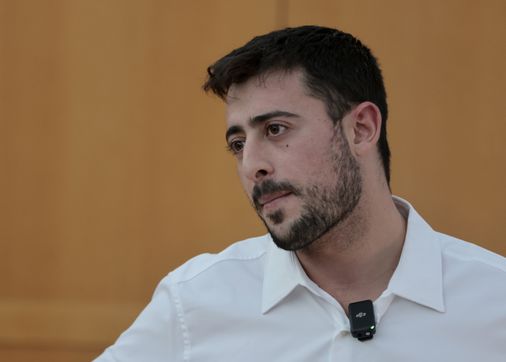
CAMBRIDGE — As a rapt audience fought back tears, a survivor of the attack on an Israeli music festival by Hamas terrorists last month recounted the horror of the massacre at Harvard Hillel on Thursday.
Jonathan Diller, a 28-year-old who grew up in Israel, was among a crowd of 3,000 people at the Nova Peace Festival when Hamas attacked, killing around 260 people and taking many hostages.
Since the attack, Diller has spoken at universities around the country, including Yale and Columbia, telling his story in the hopes of combating a rise in antisemitism, he said.
Although he has recounted his experience on numerous occasions in recent weeeks, the story is still difficult to tell.
”How do I start? I’ve told this story quite a few times in the last few weeks, but it’s still…,” he said to an audience of about 60 people, with another 40 watching on Zoom.
After Shabbat dinner on Oct. 6, Diller almost decided he was too tired to go to the festival. But he summoned the energy. Eventually, he and his friend arrived at the all-night event around 4 a.m. and joined a larger group of friends.
Around 6 a.m. Diller convinced his friends to go to the dance floor. Twenty minutes later, they saw dozens of missiles flying above. At first, the music played on, and some continued to dance, Diller recalled.
But then the police urged people to “take your stuff and find shelter.”
Still, the crowd of about 3,000 people had no idea about the extent of the attack, Diller said. But when Diller and his friend were in their car driving away, a car ahead of them made a U-turn and came back toward them. Inside was a woman who appeared to have been shot in the knee. Diller and about 10 others rushed to her aid.
They then heard heavy gunfire as rockets continued to fly above their heads, he said.
They decided to abandon the car and took cover in a nearby valley. Diller looked at a map on his phone and found a town that was more than 10 miles away before switching his phone to airplane mode to save battery.
“We put our heads down and kept walking,” Diller recalled.
The group walked for four hours until they were greeted by people who fed them and charged their phones. He returned home later that afternoon from “the longest day of his life.”
When his mother asked where he had been, he tried to avoid telling her, but eventually said he had been at the festival and managed to escape the attack.
His mother gave him the longest hug of his life while swearing at him, he recalled.
Two of Diller’s friends were killed in the attack, he said. Three are being held hostage in Gaza.
“There are people that went through much more hell than me, but I’m not here to compare myself to them,” he said. “I’m here to tell my truth.”
After telling his story, Diller answered questions from the crowd.
Asked how people can support Israel right now, he recommended they follow Israeli social media accounts, convey accurate information about the conflict, have calm discussions with their peers, and donate to relief groups.
He also encouraged conversations with those who are divided over the Israeli-Palestinian conflict. While some people are firm in their beliefs and reluctant to change their minds, people in the middle are open to persuasion, he said.
”I’m not a politician, and I’m not here to talk any politics. I’m here to tell my story,” he said.
Raphael Rouvinov, a recent Harvard graduate who attended the event, said he has read a number of survivor stories online and felt it was important to hear one in-person.
He said it has been hard seeing how hateful people have been on social media since the war began, even if those people are in the minority.
”It’s crazy,” he said. “Calm voices don’t go viral.”
Aryeh Padwa, a student at Harvard, said he is more empowered to discuss the massacre after hearing Diller’s story.
He said he hasn’t received any backlash as a Jewish student despite the intense emotions over the war. He said he continues to wear religious clothing and the only thing that has changed for him is that more people have asked if his friends and family are OK.
Padwa said his Jewish friends have been less fortunate.
”A lot of people here tell me they feel personally threatened or physically unsafe,” he said.
But he thinks things will improve for Jewish students as the war persists.
”People have stopped caring a little bit,” he said. “I don’t think a lot of people ever really cared, they just wanted to show that they care because it’s cool to care.”
Talia Lissauer can be reached at [email protected]. Follow her on Instgram @_ttphotos.
